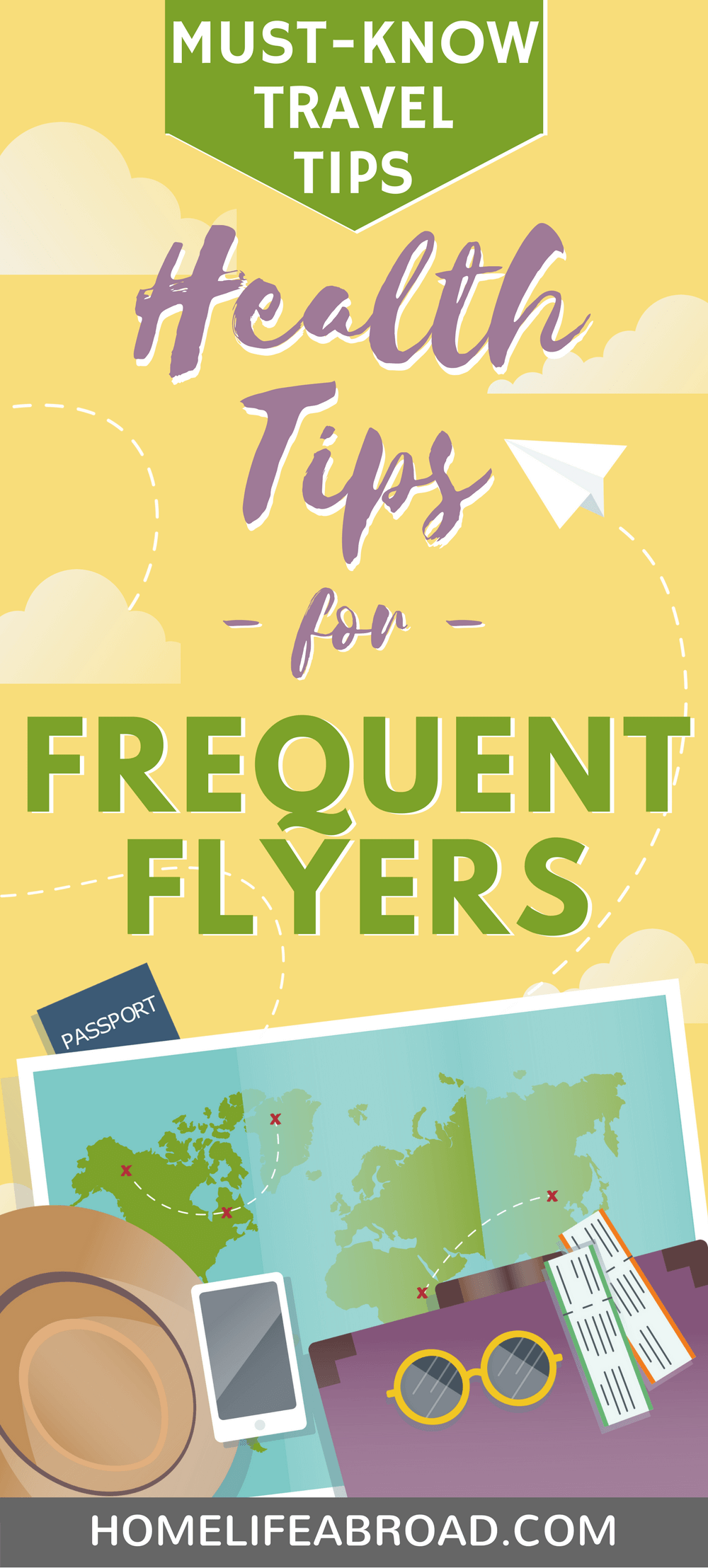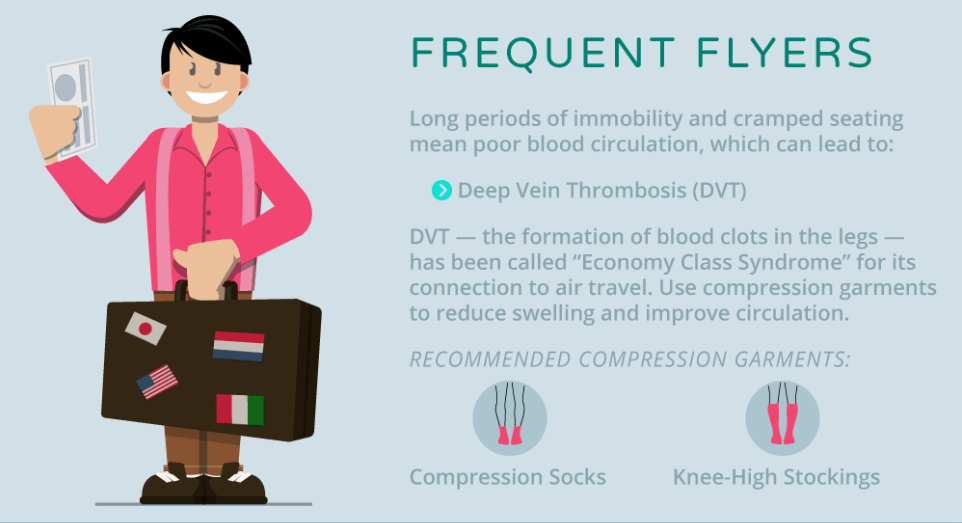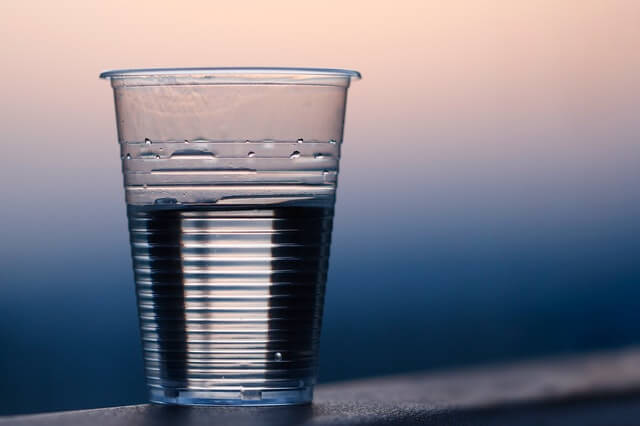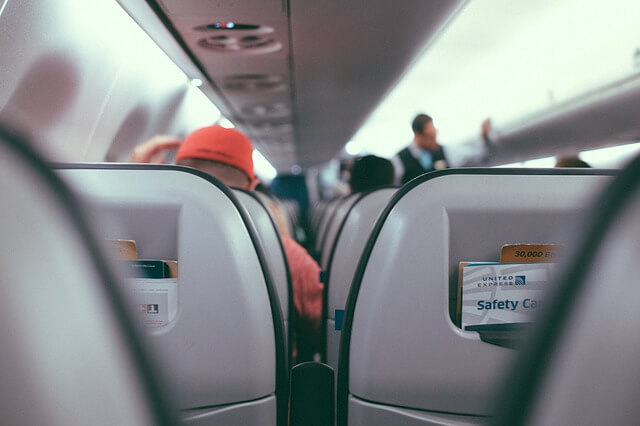I love traveling but I’m a terrible flyer – I just can’t fly without feeling terrible motion sickness, cramps, and lowered blood pressure.
Flying is my end-all, especially when I’m taking very long 13-hour flights back home.
Thankfully, with patience and experience, I’ve learned how to keep myself feeling better and remaining healthy throughout the entire flight.
These health tips are all based on my personal experience – hopefully, they can help you, too!

1) Improve circulation with compression therapy socks
For people like me who have to travel very long distances, compression therapy socks can make all the difference in our physical well-being throughout the flight.
Long periods of immobility, such as sitting on those cramped economy seats, cause poor blood circulation.
I’m sure you’ve felt it – after a few hours of sitting on your seat, your feet start feeling stiff. Stretching them and walking a bit may help, but you’ll be back to the same problem in no time.
This poor blood circulation can lead to the dangerous formation of blood clots in the legs, which is nicknamed “Economy Class Syndrome” with good reason.
By using compression garments (compression socks or knee-high stockings will do), you can reduce swelling and improve circulation to your feet and legs.
Since I’ve started using compression socks on long flights, my feet don’t get stiff or cold anymore, and I feel much better.

2) Forget about motion sickness with airsickness pills
I’m not one to take medication easily – I’m always hesitant to take any over-the-counter or prescribed medication unless absolutely necessary.
My airsickness is so terrible, that I prefer to take a pill that will help me survive the flight.
What is airsickness? According to The Balance:
Airsickness is the result of the body’s reaction to different signals it tries to interpret. While flying in an airplane, your eyes tend to adjust to the movement as if you’re barely moving. Your body, specifically your inner ear, reacts to the actual movement in relation to gravity and tells your brain what it feels. The conflict of signals confuses the body, creating a feeling of nausea along with many other symptoms.
This results in queasiness, nausea, fatigue, chills, vomiting, headaches, and dizziness – and I get them all in one fast go.
There are plenty of alternatives to taking medication, such as natural remedies, meditation pre-boarding, staying hydrated, and eating a nutritious diet, so I recommend starting with those.
However, if like me, nothing else works, it’s time to try medication that will alleviate the symptoms talk to your doctor to find the best available fit for your symptoms.
3) Drink – it’s extremely important
It’s easy to forget to drink enough on a flight… we limit ourselves to waiting for the moments when the air stewards bring us drinks for consumption.
Since security protocol doesn’t allow passengers to take any liquids through the security check, it makes staying hydrated even more difficult.

Throughout the flight, make sure to get up and head to the galley to drink at least every 2 hours. Usually, there are numerous bottles of water and cups left there for passengers to freely take and drink.
Forget carbonated beverages – they will make you feel unwell quickly due to the gas. Alcohol, combined with the air pressure, can impact your body and mind differently than the ground, so it’s best to avoid it.
Keep away from the hot drinks as well; the word is that the water source is from unclean water tanks that are rarely cleaned out.
So bottled water is your best bet.
4) Keep active throughout the flight
Periods of immobility increase the risk of deep vein thrombosis (DVT).
If you’re not wearing compression socks to help alleviate this (and even if you are), you still need to keep your muscles moving.
Don’t stay immobile in your seat for hours at a time – stretch your legs, arms, and body every so often.
Make sure to walk around the plane once in a while to keep your legs moving and muscles contracting.
This works hand-in-hand with tip #3: if you continue to get up to drink water, not only are you moving your body by walking there, but you will also have to get up often to use the lavatory.
It’s a win-win situation!
5) Meditate problems away
I know first-hand the many annoyances present in the economy cabin and how sometimes, you just can’t control the feelings of frustration or anger.
There are so many ways to get frustrated: children kicking the seat non-stop, neighbors taking up personal space, airport delays, rude airline employees, and the list can go on and on.

However, this is all damaging to the personal psyche and your overall health throughout the flight.
You can’t control those around you, but you can try to control your own temper and calm down anxieties and anger.
Take a deep breath, close your eyes, and focus on the good – like how you’re about to go on an exciting trip, or the family and friends you will be visiting.
Remember that you’re only on the plane for a limited time… it’s all in the now but it will soon all be in the long-lost past.
Check out this instructional infographic on all the ways compression garbs help – I swear by them!
Are you a frequent flyer? Share more great health tips with me below!
Thanks to Freepik for the original version of the featured image.






I’m not a very frequent flyer yet, but will have several flights soon. Very good and useful tips, thanks!
Great tips, especially for those long flights! I don’t fly very often, but know we will be doing a lot of traveling in the near future.
My son has motion sickness so I always give him motion sickness pills whenever we travel – whether by land or by air. Works everytime. 🙂
They are life savers! I can’t believe I didn’t use them before last year… it really would have made travelling so much easier for me.
Such a great helpful tips. especially for those who had a long flight. Thanks for sharing this article.
These tips are spot on. And compression socks are a great idea. When I went backpacking in Europe water or blood pooled in my ankles after sleeping sitting up on a 10 hour train ride. I’m sure those socks would have prevented this.
I also find having chewing gum helps a TON with the pressure changes. Wouldn’t fly w/o it!
These are all great tips for those who are frequent flyers. It is so important to at least get up while in the air to at least walk to the bathroom. The compression socks are a great alternative also. Thanks for sharing the information.
My legs will get so sore sitting. I never really thought to wear compression socks, but I will now
Health and wellness are the primary concerns of humans all over the world. It is important for us to be healthy. This is such a great tips to open the mind of everyone.
Health is wealth and prevention is better than hospital bills. It is people’s dream to have a healthy body. These tips will help people achieve their good health while traveling.
My kids and I fly often and I feel fortunate that none of us go through any of these. It’s really important to stay hydrated though. These are great tips! It’s also perfect for those who are traveling for the first time.